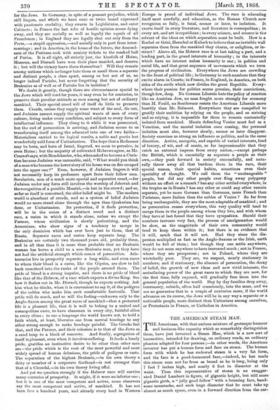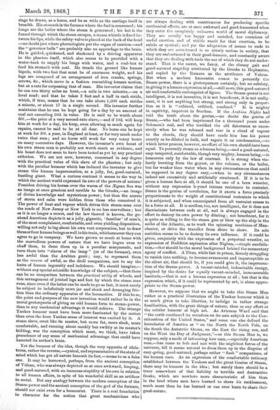THE AMERICAN STEAM MAN.
THE Americans, with that curious mixture of grotesque humour and business-like capacity which so remarkably distinguishes them, have just invented a Steam Man, which is a new sort of locomotive, intended for drawing, on ordinary roads, an ordinary phaeton adapted for four persons ;—in other words, the American inventor has put a human form and face on steam. The human form with which he has endowed steam is a very fat form, and the face is a good-humoured face,—indeed, he has made this steam man not far from as broad as he is long, being only 7 feet 7 inches high, and nearly 6 feet in diameter at the waist. Thus this representative of steam is an exagger- ated Daniel Lambert in figure, of gigantic height, but still more gigantic girth, a " jolly good fellow" with a beaming face, hand- some moustache, and such huge diameter that he must take up almost as much space, even in a forward direction from the car-
riage he draws, as a horse, and be as wide as the carriage itself in breadth. His stomach is the furnace where the fuel is consumed ; his lungs are the boiler where the steam is generated ; his hat is the funnel through which the steam escapes, a steam whistle is fixed be- tween his lips, while the safety-valve is placed at the back of the head —no doubt just where phrenologists put the organ of caution—and the " governor balls" are probably also an appendage to the brain.
He is guided, quickened, and slackened by a driving apparatus in the phaeton itself, which also seems to be provided with a water-tank to supply his lungs with water, and a coal-box to feed his stomach with coal. He treads the ground like human bipeds, with two feet that must be of enormous weight, and his legs are composed of an arrangement of iron cranks, springs, screws, &c., which move in a fashion resembling human motion, but at a rate far surpassing that of man. His inventor claims that lie can run thirty miles an hour,—a mile in two minutes,—on a level road ; and that he takes 2 feet and a half in each stride, which, if true, means that he can take above 1,000 such strides
a minute, or about 17 in a single• second. His inventor further
maintains that he can be kept going for a day by an amount of coal not exceeding 10d. in value. He is said to be worth about 60/.,—the price of a very second-rate slave,—and if 10d. will keep him at work for a day, his keep, even allowing as much again for repairs, cannot be said to be at all dear. No horse can be kept at work for 301. a year, in England at least, or for very much under twice that sum ; and no horse will work for very many hours on many successive days. However, the inventor's own boast of his own steam man is probably not worth much as evidence, and hie boast does not seem to have been tested as yet by any practical criterion. We are not now, however, concerned in any degree -with the practical value of this slave of the phaeton ; but only with the peculiar humour which has induced the inventor to give .steam this human impersonation, as a jolly, fat, good-natured, bustling giant. What a curious contrast it seems to the way in which the ancient world expressed its awe of the powers of nature !
Poseidon driving his horses over the waves of the 2Egean Sea was An image at once gracious and terrible to the Greeks,—an image of divine knowledge and mysterious power ; but then the secrets of storm and calm were hidden from those who conceived it.
The power of heat and vapour which drives this steam-man over the roads of New Jersey or New York is no less marvellous ; but as it is no longer a secret, and the law thereof is known, the go- ahead American depicts it as a jolly, gigantic, familiar' of man's, -of the most complaisant, comfortable, and even yielding disposition, willing not only to lug about his own vast corporation, but to draw threeor four humanbeings as well in his train, whithersoever they can agree to go in company. We have grown so much at home with the marvellous powers of nature that we have begun even to chaff them, to dress them up in a peculiar masquerade, and turn them into "slaves of the lamp " (or of the furnace), even less awful than the Arabian genii ; nay, to represent them
as the reverse of awful, as the droll companions, not to say the butts of human ingenuity and indolence. We should imagine,—
without any special scientific knowledge of the subject,—that there
-can be no comparison between the practical utility of wheels, and this arrangement of jointed legs and feet by which the steam man
runs, since even if the latter can be made to go as fast, it must surely be subject to indefinitely more jar and shock and deranging fric- tion than the ordinary apparatus of the locomotive. If this be so, the point and purpose of the new invention would rather be in the moral grotesquerie-of giving an odd human form to steam-power, than in any mechanical advantage it would achieve. The strange Yankee humour must have been more fascinated by the notion than even the keen Yankee sense of interest was excited by it. A steam slave, erect like its master, but more fat, more sleek, more 'comfortable, and running about meekly but swiftly at its master's bidding, was the conception which must, we think, have taken precedence of any sense of mechanical advantage that could have haunted its author's brain.
Yet the humour of the idea, though the very opposite of idola- trous, rather the reverse,—cynical, and representative of the state of mind which has got all nature beneath its feet,—seems to us a false -one. It may be borrowed, perhaps, from the ancient conception of Vulcan, who was always depicted as at once awkward, limping, and good-natured, with an immense stupidity of his own in relation to all human affairs, in spite of his wonderful skill as an artificer in metal. But any analogy between the modern conception of the -Steam-power and the ancient conception of the god of the furnace, should not exist even for a humourist. There is a real foundation in character for the notion that great mechanicians who are always dealing with contrivances for producing specific mechanical effects, are at once awkward and good-humoured when they enter the completely unknown world of moral diplomacy.
They are usually too happy and satisfied, too conscious of useful exertion and of visible result for that exertion, to be subtle or cynical ; and yet the adaptation of means to ends to which they are accustomed is so utterly useless in society, that they are embarrassed in their good-humour, and constantly aware that they are dealing with tools the use of which they do not under- stand. That is the secret, we fancy, of the clumsy gait and good-natured stupidity attributed by the Greeks to Hephaastus, and copied by the Romans as the attributes of Vulcan.
But when a modern humourist conies to personify the Steam-power, there is a grotesqueness certainly, but no subtlety, in giving it a human expression at all,—still more, this good-natured air and comfortable embonpoint of figure. The Steam-power is not intelligent, it is not inventive, it is not beneficent, it is not malig-
nant, it is not anything but strong, and strong only in propor- tion as it is " cabined, cribbed, confined." It is mighty in captivity, impotent in freedom. If the Arabian Nights had told the truth about the genius,—no doubt the genius of Steam,—who had been imprisoned for a thousand years under Solomon's seal, and who terrified the old fisherman so exces- sively when he was released and rose in a cloud of vapour to the clouds, they should have made him lose his power exactly as he dilated in bulk, and regain it on condensation,—to which latter process, however, no effort of his own should have been equal. To personify steam as a human being,—and a good-natured, easy-tempered, comfortable, though very mighty, human being,—is humorous only by the law of contrast. It is strong when vio- lently bursting from the geyser, or the volcano, or the boiler, but far weaker than water when in any circumstances that could be supposed in any degree easy,—when in any circumstances indeed not excessively and artificially straitened. If it is to be given a human face at all, it should be one of a born wrestler, without any expression beyond intense resistance to restraint. Steam is the genius of revolution, for it exerts a force precisely proportionate to the weight of constitutional restraints to which it is subjected, and when emancipated from all restraint ceases to be a force at all. It is soulless, too, not intelligent, for it does not discriminate between ends at all, and is always engaged in the effort to destroy its own power by dilating ; not beneficent, for it is quite as willing to fire the steam gun or blow up the ship in the midst of the Atlantic, as to work the spinning machines of Man- chester, or drive the traveller from shore to shore. Its sole ambition seems to be to destroy its own influence. If it could be given, conjointly with the expression of a perpetual wrestler, an expression of Buddhist aspiration after Nigban, —sitnple annihila- tion,—that should be the moral background behind the momentary agony of conflict. A Titan, while fast in prison, fiercely struggling to vanish into nothing, to become evanescent and imperceptible as the silent air, that should be, if you could give it, the impersona- tion of the Steam-power. A vacant-minded, indomitable energy, inspired by the desire for equally vacant-minded, immeasurable lassitude,—that is not a human expression at all ; but that is the expression which, if it could be represented by art, is alone appro- priate to the Steam-power.
However, we suppose that we ought to take this Steam Man rather as a practical illustration of the Yankee humour which is so much given to take liberties, to indulge in rather strange familiarities, with the great things of nature, than as any effort at the subtler humour of high art. As Artemus Ward said that "the earth continued its rotashun on its axis subj6ck to the Con- stitoosbun of the United States," and some one else defined the boundaries of America as " on the North the North Pole, on the South the Antarctic Ocean, on the East the rising sun, and on the West the Day of Judgment,"—so this Steam Man is, we suppose, only a mode of intimating how man,—especially American man,—has come to hob and nob with the mightiest forces of the universe, till it seems natural to dress them up in the disguise of easy-going, good-natured, perhaps rather " flash " companions, of the human race. As an expression of the comfortable intimacy established between the Yankees and the great Genius of Steam, there may be humour in the idea ; but surely there should be a trace somewhere of that liability to terrible and destructive freaks, which are nowhere more characteristic of him than in the land where men have learned to share his recklessness, much more than he has learned or can ever learn to share their good-nature.



































 Previous page
Previous page